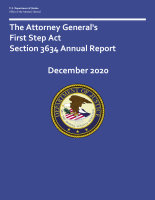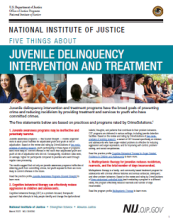Adult correctional facilities
Race and the Geography of Opportunity in the Post-Prison Labor Market
Leveraging Technology to Support Prisoner Reentry
Taking Stock: An Overview of NIJ's Reentry Research Portfolio and Assessing the Impact of the Pandemic on Reentry Research
Over several decades, the National Institute of Justice (NIJ) has made significant contributions to the field of reentry, specifically what works for whom and when. In recent years, however, the global pandemic has made it increasingly difficult to conduct research on and with populations involved with the justice system. During this time, many researchers assessing various justice-related outcomes were unable to continue their inquiries as planned due to a lack of access to their populations of interest, forcing many to pivot and rethink their research designs.
See the YouTube Terms of Service and Google Privacy Policy
Learning from Doing Evaluating the Effectiveness of the Second Chance Act Grant Program
Reauthorized in 2018, the Second Chance Act (SCA) aims to reduce recidivism and improve outcomes for people returning from state and federal prisons, local jails, and juvenile facilities through the provision of federal grants. During this panel, National Institute of Justice-funded researchers will detail two ongoing evaluations of the SCA grant program:
- An evaluation of the effectiveness of the SCA grant program per Title V of the First Step Act.
- A longitudinal examination of the long-term impacts of the SCA program.
See the YouTube Terms of Service and Google Privacy Policy
The Hidden Costs of Reentry: Understanding the Barriers to Removing a Criminal Record
NIJ hosted a webinar to discuss under-researched aspects of reentry: expungement of criminal records and the impact of those records. This webinar includes a presentation of ongoing research projects examining the impact of legal aid for expungement and past research projects studying the accuracy and permanency of criminal records and the prevalence of collateral consequences of conviction. A Q&A session will conclude this webinar.
See the YouTube Terms of Service and Google Privacy Policy
From Successful Reentry to Stronger Communities
Just Science Podcast: Just Trauma-Informed Approaches and Advocacy for Vulnerable Populations
A transnational perspective on the evolution of the synthetic cannabinoid receptor agonists market: Comparing prison and general populations
Desistance: It's a Process, Not an Event
The Attorney General's First Step Act Section 3634 Annual Report December 2020
Predicting Recidivism: Continuing To Improve the Bureau of Prisons' Risk Assessment Tool, PATTERN
Non-random Study Attrition: Assessing Correction Techniques and the Magnitude of Bias in a Longitudinal Study of Reentry from Prison
Learning from Doing: Evaluating the Effectiveness of the Second Chance Act Grant Program







